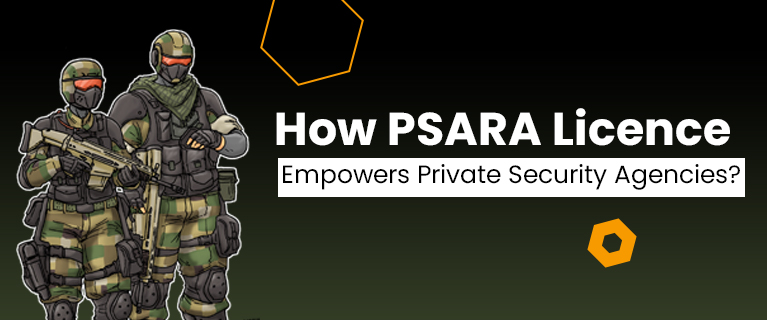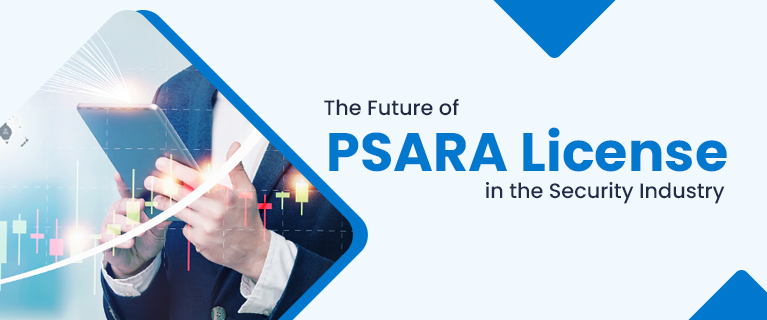How PSARA Licence Empowers Private Security Agencies?
In today's world, safety and security are paramount concerns for individuals, organisations, and society as a whole. Private security agencies play a crucial role in safeguarding people, property, and assets. To operate legally and effectively, private security agencies in India are required to obtain a Private Security Agency Regulation Act (PSARA) licence. In this blog, we will explore the significance of the PSARA licence, its requirements, and the benefits it offers to private security agencies and the community.
Read also this -: What are the Essential Conditions of PSARA License1. Understanding the PSARA License:
The Private Security Agency Regulation Act (PSARA) is a legislative framework established by the Indian government to regulate the functioning and operations of private security agencies. The PSARA licence is a mandatory requirement for private security agencies to operate legally in India. It aims to ensure that private security services are provided with professionalism, accountability, and adherence to legal and ethical standards.
2. Enhancing Professionalism and Accountability:
The PSARA licence promotes professionalism and accountability within the private security industry. To obtain the licence, private security agencies must meet specific criteria, including having a proper organisational structure, employing trained and verified security personnel, and complying with background verification and code of conduct requirements. This ensures that private security agencies maintain high standards of professionalism, integrity, and ethical conduct in their operations.
3. Ensuring Quality and Competence:
The PSARA licence establishes a framework for ensuring the quality and competence of private security agencies. It mandates that security personnel employed by licensed agencies undergo comprehensive training programs to acquire the necessary skills and knowledge for their roles. This includes training on crowd management, surveillance techniques, emergency response, and conflict resolution. By enforcing such training requirements, the PSARA licence ensures that private security personnel are capable of providing effective security services.
4. Safeguarding Public Trust and Confidence:
The PSARA licence instils public trust and confidence in private security agencies. The licensing process involves thorough scrutiny of the agency's credentials, background verification of its owners and directors, and verification of its financial stability. This scrutiny assures clients and the public that the licensed agency is trustworthy, reliable, and compliant with legal and regulatory requirements. It contributes to building a positive reputation for private security agencies and fosters trust between clients and service providers.
5. Ensuring Compliance with Legal and Regulatory Frameworks:
The PSARA licence ensures that private security agencies operate within the legal and regulatory framework set by the government. Licensed agencies must adhere to various statutory obligations, including labour laws, minimum wages, employee benefits, and tax compliance. By obtaining the PSARA licence private security agencies demonstrate their commitment to upholding legal and ethical standards, protecting the rights and welfare of their personnel, and contributing to a fair and transparent security industry.
6. Enhancing Safety and Security for Clients:
The PSARA licence enhances safety and security for clients by ensuring that private security agencies have the necessary infrastructure, resources, and expertise to provide effective security solutions. Licensed agencies are required to maintain appropriate equipment, technology, and communication systems to handle security challenges. They must also develop robust standard operating procedures, contingency plans, and emergency response protocols to address various security scenarios. This commitment to preparedness and professionalism enhances the safety and security of clients and their assets.
7. Facilitating Public-Private Partnerships:
The PSARA licence facilitates public-private partnerships in the domain of security and safety. Licensed private security agencies can collaborate with government agencies, law enforcement bodies, and other stakeholders to support and supplement their efforts in maintaining public order, crime prevention, and disaster management. These partnerships leverage the capabilities and resources of private security agencies, creating a coordinated and integrated approach to address security challenges at both the public and private levels.
8. Employment Generation and Skill Development:
The PSARA licence promotes employment generation and skill development within the private security sector. Licensed agencies are required to provide proper training and professional development opportunities to their security personnel. This not only enhances their skills and employability but also contributes to the socio-economic development of the country by creating job opportunities for individuals from diverse backgrounds. The PSARA licence thus plays a role in empowering the workforce and supporting the growth of the private security industry.
9. Complying with International Standards:
The PSARA licence aligns with international standards and best practices in the private security industry. It brings Indian private security agencies in line with global expectations for professionalism, training, and service quality. This alignment opens doors for collaborations, partnerships, and potential expansion into international markets, further contributing to the growth and recognition of the Indian private security industry.
10. Safeguarding National Security:
The PSARA licence plays a crucial role in safeguarding national security. Private security agencies are often involved in protecting critical infrastructure, corporate establishments, public spaces, and high-profile events. By ensuring that licensed agencies operate within legal and regulatory frameworks, the PSARA licence helps prevent security breaches, unauthorised access, and potential threats to national security. It strengthens the overall security ecosystem and contributes to the safety and well-being of the nation.
Read also this -: How to Apply Online for a PSARA LicenseConclusion
the PSARA licence plays a vital role in empowering private security agencies to provide effective, accountable, and professional security services. By promoting professionalism, ensuring quality and competence, and safeguarding public trust, the PSARA licence enhances safety and security for clients. It facilitates compliance with legal and regulatory frameworks, supports public-private partnerships, and contributes to employment generation and skill development. Ultimately, the PSARA licence serves as a cornerstone in ensuring national security by promoting a robust and responsible private security industry.



Comments
Post a Comment